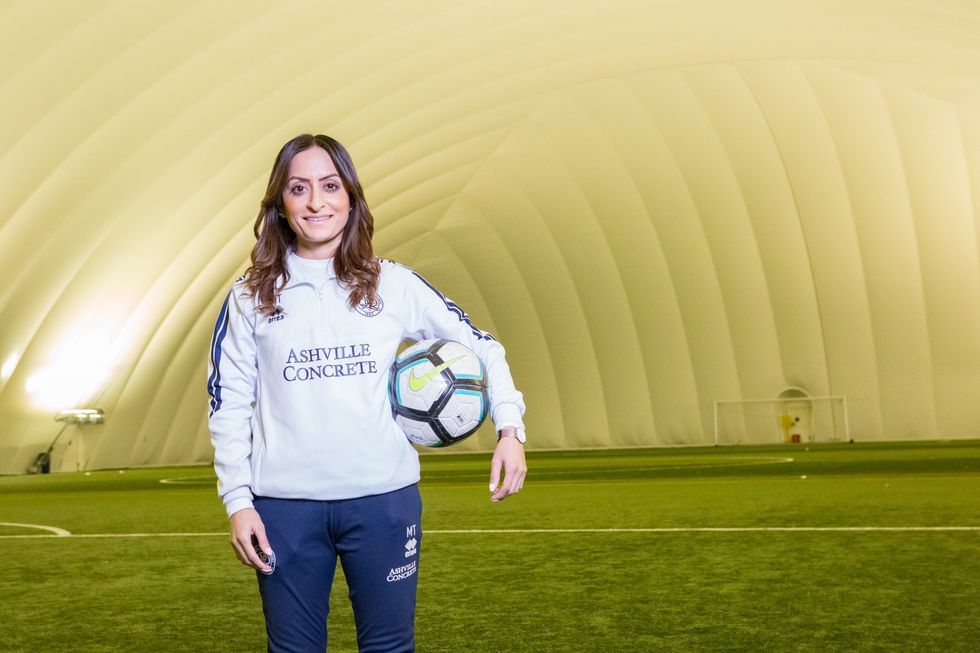by NADEEM BADSHAH
FOOTBALL may not have come home but the success of the men's and women's England teams has led to a boom in the number of young south Asian female players, according to coaches.
Since the 2019 Women's World Cup, rising stars have emerged including England youth international Simran Jhamat who joined Bristol City Women in July to become the first British Asian professional in the club's history.
Teenager Roop Kaur plays for Queens Park Rangers Girls Under 16s, Rosie Kmita is at Watford, while Birmingham Under 16s signed Layla Banaras.
Prior to the Women's World Cup two years ago, there were no players of south Asian origin in the Women's Super League.
And experts believe after England's men reached the Euro 2020 final in July and the women's European Championships taking place next summer, there will be more youngsters with the goal of playing pro football.
Manisha Tailor MBE, who was recently promoted to assistant head of academy coaching at Queens Park Rangers, told Eastern Eye: "I think that the commitment from The Football Association and governing bodies to make football accessible to South Asian female players has inevitably resulted in an increase in participation.
"In addition to the men's Euros, there is build up towards the women's euros next year which is great to see as it is certainly inspiring girls and women to take up the sport.
"Role models such as Simran and Rosie, as well as Lucindha Lawson, are at the heart of creating change towards seeing more elite South Asian female footballers."

It comes after Jhamat was hailed as "a fantastic role model" by her former manager Vicky Jepson who believes she can inspire the next generation of British Asian female footballers.
The 20-year-old from Walsall, Midlands, was spotted playing for Sporting Khalsa before being approached by Aston Villa's Girls' Centre of Excellence where she spent seven seasons before joining Liverpool.
Arun Kang OBE, CEO of the Sporting Equals charity, said we are all aware of the power and positivity that role models can have on communities as "you cannot be what you cannot see".
But he told Eastern Eye: "While we do not want to dampen the current positive trajectory of the England (men's) team, we at Sporting Equals can't help but question the true strength of the diversity within the England men's squad.
"These claims of excellent diversity are in reference to some ethnically diverse communities being present while others are wholly unrepresented.
"We have spoken at length about the importance of sporting bodies becoming specific with community approaches through our terminology advocacy work and how they must move away from looking at diversity through a selective umbrella lens whereby they can engage with selective communities and ignore others."
Sporting Equals created the British Asians Sport and Physical Activity (BASPA) Network to raise awareness and challenge sporting bodies to do more on developing talent, coaching and leadership roles.
Kang added: "Often these necessary discussions are quieted with cultural stereotypes and perceptions of barriers that do not actually exist or persist.
"However, there is more than enough research to highlight that British South Asians are very active in football there are unconscious and conscious biases at play that actively prevent them from reaching elite-level talent status.
"We hope that the footballing bodies will reflect on any positive learnings from community and talent engagement and retention within the England women's squad and implement such learnings for the men's game so that in future tournaments British South Asians may also see concrete representation and diverse talent."
British Asians make up seven per cent of the UK population but only 0.25 per cent of professional footballers, according to research.
Yashmin Harun BEM, chair and founder of The Muslimah Sports Association (MSA), said the increase in Asian players has been encouraged due to the positive work by the Football Association and the media.
She added: "We cannot underestimate the importance of positive stories and the impact it has on our communities.
"At Frenford & MSA WFC we have had a huge uptake of female players from age five to adults, with a majority from an Asian background. This is due to these players and parents seeing females who look like them playing football.
"The more stories we are able to promote and tell the more parents and players will be encouraged to take up football and create pathways.
"The unfortunate events which took place at the Euro 2020 final [involving some spectators trying to watch the match without a ticket] should not deter Asian fans from attending games in future and with the Women’s Euro 2022 coming to Wembley, it’s a perfect opportunity to experience the game.”

A community football club looking to encourage more female players is Southall Athletic FC in London, who play in Division One of the Middlesex County League.
Ajay Gore, co-founder and chairman of the women's team, said: “South Asian males are underrepresented in football, the only other group more underrepresented than that is South Asian females.
“The main goal with this team is to increase the participation of South Asian women in the sport.
“We want this club to be a legacy in the community long after our times and we want it to be a club that little kids grow up wanting to play for.”
Sim was encouraged to join Southall Athletic FC by friends and family. She previously played for Brentford FC before taking a break from the sport.
Sim said: “I’m back into what I used to love.
“There’s such a big taboo with Indian girls playing football, now there’s a community football club that’s allowing females to join in.
"It’s a good opportunity for girls like me to get back into it and prove certain people wrong.”






 Owen Patrick Joyner’s character faces off with a jammed vending machine in a tense moment from Final Destination: BloodlinesYoutube
Owen Patrick Joyner’s character faces off with a jammed vending machine in a tense moment from Final Destination: BloodlinesYoutube 












